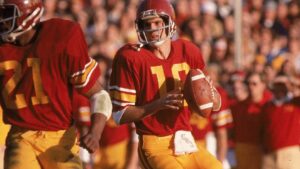A day after New Year, 2006 former Ohio State star running back Maurice Clarett walked into a police station to turn himself in. On the field that day his former Buckeyes team was defeating the Notre Dame Fighting Irish 34-20 in the Fiesta Bowl. The irony was not lost on college football fans who knew that only three years earlier Clarett ran for two touchdowns, including the overtime game-winner in the 2003 Fiesta Bowl in a 31-24 Ohio State victory over Miami.
After Clarett’s arrest, he was tried and found guilty of armed robbery. At the sentencing hearing, a statement from one of the robbery victims was read in court. It said, “Mr. Clarett, we hope you will use this opportunity to help someone along the way.”
Helping others is exactly what Maurice Clarett has done.
Prior to arriving at Ohio State, Clarett grew up in Youngstown, Ohio. In his book, “One and Done,” Clarett describes his hometown this way. “There were lots of murders and robberies. The gangs in Youngstown at the time were really heavy.” He added, “The first time I saw someone getting killed with my own two eyes was when I was 10 years old, in the 4th grade.”
Clarett soon took to a life on the streets; drinking, getting high, stealing cars, robbing stores, and selling drugs. He was already placed in juvenile detention three times before even finishing middle school and was only saved from a permanent life in jail because he could play football. By the time Clarett’s senior season of high school football rolled around, he was being recruited by every major college football program in the nation before settling on Ohio State.
A few months after leading Ohio State to the national championship, trouble reappeared in Clarett’s life. The NCAA investigated him for an incident where more than $10,000 worth of clothing, cash, CDs, and stereo equipment was stolen from a car that Clarett had borrowed from a dealership in Ohio. He was later charged with lying to the police on the theft report and was suspended from Ohio State for the season.
Taken away from football, Clarett’s life spiraled out of control. While appearing on the Today show to promote “One and Done,” Clarett described what happened. “I got a ton of violations and they eventually suspended me. The next thing you know I was substituting by drinking and drugging.”
Clarett went on to explain the dark place he had entered when he was kicked off the team. “When you’re going through your despair, I think that you have these self-defeating thoughts that, you know, ‘This will be the rest of my life.’” He added, “You’re looking at life like it’s just this endless despair or just this confusing place.”
Clarett’s downward spiral of drugs, drinking, and crime hit rock bottom when he was arrested and placed in jail. Although prison is not a path that should be recommended to anyone, the pause in his life gave Clarett the opportunity to evaluate who he was and where he wanted to go. He became a student of life. He told Today, “The biggest thing that helped me was reading. Reading really saved my life.” Nearly four years after being locked up, Clarett walked out a free man. He said, “When I got out of prison, I was on a mission, a vow to help people.”
Clarett found that the best way he could help people was to tell his story. His talks are designed to steer the audience away from repeating the mistakes he made or uplifting them to believe that they can rise out of their despair. These stories are especially relatable for young athletes from disenfranchised neighborhoods and for men serving time in prison.
It turns out the man can talk. Clarett has become a highly sought-after guest with more than 400 speaking appearances at universities and organizations.
Clarett took the money he earned from those talks to invest back into his hometown. Even though he had a tough upbringing, Clarett has always had a deep love for Youngstown. His dedication to his hometown, and desire to help people suffering from the same challenges he faced, inspired him to start The Red Zone, a mental health counseling and substance abuse agency. In his book, Clarett summed up his desire to help people by saying, “This is the work I was put on the planet to do and I have found my purpose.”
The trials and tribulations that Clarett went through allowed him to understand the pain that many other people are experiencing and give them firsthand advice on how to find the light at the end of the tunnel. Author Sue Frederick once said, “Our greatest work offers to the world what we wished had been offered to us when we were in our greatest pain.” Clarett’s greatest effectiveness comes from the fact that he felt the very same pain that many of the people he speaks to are now suffering.
Pain that is experienced in this lifetime is not exclusive. Many other people have lived through similar situations that you might be going through. It is in those times of sadness that our own pain is actually a gift that can be shared to comfort and ease the pain of others. And, an interesting thing often happens when we channel our pain to help others — we also heal ourselves.
Through the work that Maurice Clarett is doing to help others at his mental health and substance recovery agency, it could easily be said that the person he is most helping is himself. What a wonderful gift that he has been given!







